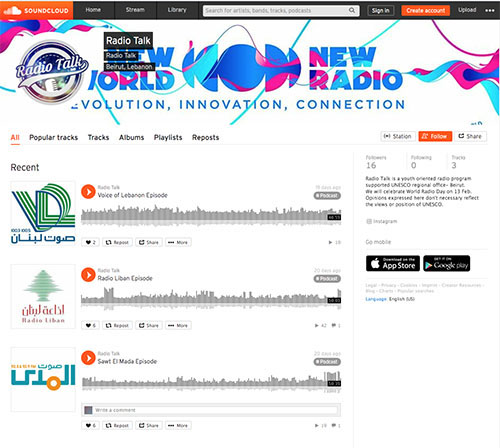Lebanese journalists should pay attention to details and not take things for granted if they’re to maintain their credibility, Media Unlimited director Magda Abu-Fadil said in a podcast interview.
From simple matters like accurately identifying interviewees to expressing themselves in grammatically correct language without any factual errors, Abu-Fadil said journalists who fail to do so undermine their trustworthiness.
“I get very upset because it’s proof of negligence, laziness and lack of professionalism,” she said about seeing her name misspelled in media reports.

Speaking to students producing youth-oriented broadcasts entitled “Radio Talk” marking World Radio Day (WRD), she said the coronavirus had been a blessing and a curse for journalism.
A curse because of constraints on people under lockdown conditions, but a blessing because it’s provided journalists with opportunities to acquire knowledge about public health issues, medicine and how to deal with a devastating pandemic.
“I conducted a workshop on how to cover the coronavirus in a professional, scientific way, and learned a lot while preparing for the training” she said.
Habib Akiki, a student from a nine-member multi-university team, interviewed Abu-Fadil as part of UNESCO’s WRD activities in February 2021, under the supervision of lecturer and communication expert Rouba El Helou.
Asked whether journalists in Lebanon can report on Covid-19 without adding their personal views, Abu-Fadil said she doubted it as they flavor their coverage with politics and sectarianism.
Turning to investigative journalism, Abu-Fadil said this type of reporting is difficult to produce for radio because it isn’t visual.
“People tend to believe more what’s tangible and visible, what they can read, what’s on TV,” she said, noting that reporters in Lebanon still haven’t mastered data journalism, and how to obtain information from documents to formulate their stories.

Journalists must combine that skill with well-written copy and good visuals like infographics, videos and attractive digital elements, but Abu-Fadil cautioned they can’t press buttons and automatically produce investigative stories since that requires hard work that could take weeks, months or years.
“Do Lebanese media have the ability and budgets to commit to good investigative reports?” she asked rhetorically.
On whether the press in Lebanon was sustainable, Abu-Fadil said many newspapers and magazines that existed in the once vibrant media milieu had disappeared and been replaced by websites with advertising revenue taking a direct hit.
“But there are alternatives, there’s financing from NGOs, and there can be crowdfunding, where money is raised through donations from different sources,” she explained.
Due to health safety concerns and remote work requirements, the student radio team was selected from different areas in Lebanon as part of a collaborative digital approach.
UNESCO’s Regional Office in Beirut celebrated WRD in collaboration with three local stations: Radio Lebanon, Voice of Lebanon and Sawt el Mada. The three programs can be heard here.
The radio stations’ managements provided the students with support, and allowed them to choose topics and guests for the shows’ various segments.
Since 2011, UNESCO has celebrated World Radio Day annually to honor the founding of United Nations radio in 1946.
Abu-Fadil’s interview can be heard here.
